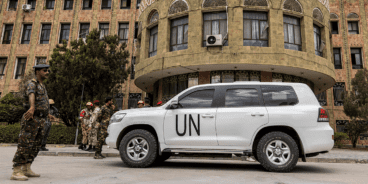
Atrocity Alert No. 124: Yemen and Cameroon
Atrocity Alert is a weekly publication by the Global Centre for the Responsibility to Protect highlighting situations where populations are at risk of, or are enduring, mass atrocity crimes.
Renewed Hodeidah offensive endangers millions of lives
Following the UN Special Envoy’s unsuccessful launch of political consultations between parties to the civil war in Yemen, government forces – with the support of the international military coalition led by Saudi Arabia and United Arab Emirates – have renewed their military offensive on Hodeidah. The escalation of hostilities in the major port city endangers the lives of hundreds of thousands of civilians, and leaves vital civilian infrastructure at risk of destruction.
The renewed offensive also leaves millions of Yemenis at increased risk of starvation. Yemen is the worst humanitarian crisis in the world, with at least 8.4 million people currently threatened by famine. Hodeidah is the entry port for approximately 80 percent of the food and fuel imports upon which over 22 million Yemenis depend.
Lise Grande, UN humanitarian coordinator for Yemen, said that: “We’re particularly worried about the Red Sea mill, which currently has 45,000 metric tonnes of food inside, enough to feed 3.5 million people for a month. If the mills are damaged or disrupted, the human cost will be incalculable.” Any obstruction of the delivery of crucial humanitarian aid due to increased hostilities in Hodeidah could potentially violate UN Security Council (UNSC) Resolutions 2140 and 2216.
Yemen is also experiencing the worst cholera epidemic in modern times. Since the outbreak began in May 2017, over 1.1 million cases have been reported and at least 2,300 people have died. Although new cholera cases have declined during 2018, according to Oxfam the water supply for 60,000 civilians in Hodeidah has been cut off, greatly increasing their vulnerability to potential infection. Increased hostilities also threaten to block the main medical evacuation and aid supply routes into and out of the city.
Since 2015 all parties to the conflict in Yemen have used indiscriminate weapons in civilian populated areas and have targeted civilian infrastructure, amounting to possible war crimes and crimes against humanity. The UN estimates that at least 10,000 people have been killed, although the actual death toll is assumed to be much higher. Despite ongoing atrocities and the growing threat of catastrophic famine, the UNSC has not passed a substantive resolution on Yemen since March 2015, more than three years ago.
The UNSC should demand an immediate ceasefire in Hodeidah. The Council should also impose targeted sanctions on all those responsible for potential war crimes, including the obstruction of vital humanitarian aid as well as the deliberate destruction of essential civilian infrastructure. This week the Human Rights Council should renew the mandate of the Group of Eminent Experts established to investigate human rights abuses within Yemen by all parties to the conflict.
Cameroon continues deadly slide towards civil war
As Cameroon prepares for presidential elections scheduled for 7 October, violence between government forces and armed separatists continues to escalate. Protests in the Anglophone regions and attacks by armed separatist groups are also likely to increase around 1 October – the anniversary of the 1961 unification between British Southern Cameroons and French Cameroun that created the modern republic.
English-speaking Cameroonians continue to be concentrated in the South-West and North-West regions of the country. During 2016 a widespread protest movement developed against their historic marginalization by the Francophone-dominated government. The protests were met with violent repression and, in response, armed separatists symbolically proclaimed the independent state of “Ambazonia” during 2017. Since January more than 400 civilians have been killed, although the actual figure could be much higher. According to the UN Office for the Coordination of Humanitarian Affairs, as of 16 August an estimated 246,000 people have been displaced in the South-West region of the country alone.
While both sides have committed grave human rights abuses, the scale and scope of abuses perpetrated by state security forces – including the elite Battalion d’Intervention Rapide (BIR) – are much greater. The BIR reports directly to President Paul Biya and has previously been deployed to fight the armed extremist group Boko Haram in the far north of the country. BIR soldiers have been accused of burning Anglophone villages, torturing detainees and perpetrating indiscriminate killings.
The government must immediately end the use of disproportionate and deadly force against civilians by the security forces, and ensure that the human rights of all Cameroonians are protected, regardless of language or cultural identity. It is imperative that the Cameroonian government and the wider international community support the initiative by religious leaders to organize an Anglophone General Conference on 21-22 November and address the underlying causes of conflict.
International allies of the government should reassess the provision of military assistance to the Cameroonian security forces in light of credible accusations of systematic human rights violations by the BIR and other elements. All violations by both the security forces and armed separatists should be independently investigated, and the perpetrators held accountable.
Related Publications


